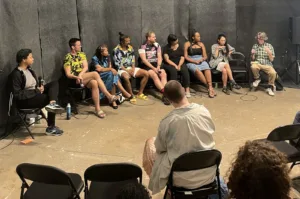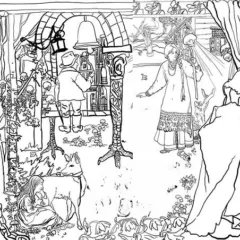Between the gallery that holds Don’t Miss Me (Lane Speidel’s current solo show at Vox Populi) and the hallway is a wall with a large circle cut out of it. Standing in the hallway, a viewer catches a glimpse of Speidel’s many assemblage pieces and of the expansive installation inside. From inside the gallery, the same circular hole opens onto the adjacent show, Flight of Fancy by Jim Strong, a friend and frequent collaborator of Speidel’s.
Lane Speidel is a trans non-binary member of Vox Populi who works as an artist, curator, and advocate. (In a 2017 Artblog interview, they speak in-depth about their curatorial series Make A Space For Me, which features performances exclusively by trans artists.) When I asked them about their current show, they told me they made this work “firstly for myself, secondly for my friends, and thirdly for trans people.”
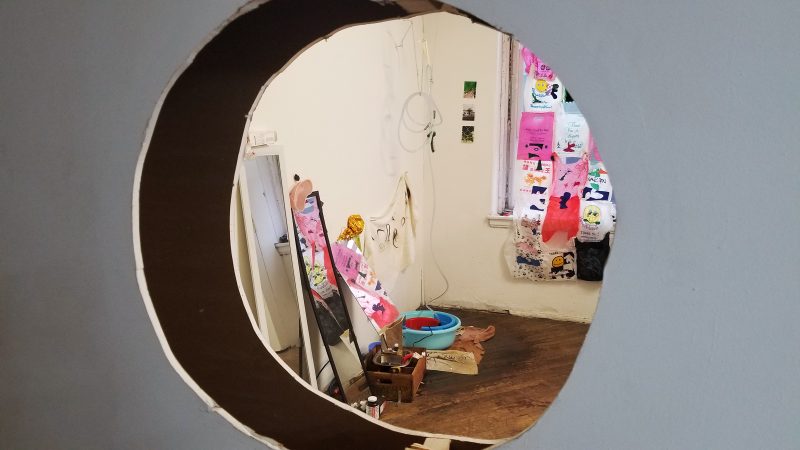
Second Skin
Redaction and collection are recurring motifs in Don’t Miss Me, and together these two processes work to deconstruct the gallery space, both literally and ideologically, making room for the letters, pillows, trash, writings and artistic practices of Speidel and their collaborators. Towards the center of the gallery is a wall of clothing, hung from the ceiling by chains of fabric. These shirts, pants and gowns are patched and knotted together and decorated with ribbons, jewelry, and refuse. Some of the apparel has text written on it; one shirt reads, “I can look however I want and still get to tell you who I am.” The clothing is decorated with holes that break the integrity of the fabric. For the duration of Don’t Miss Me, Speidel has been in an improvisational musical duo with Jim Strong called Saggy and has worn pieces from the show during their performances.
Next to this installation is another about clothing. Two tops, one real and the other painted, are placed on the wall and are accompanied by a poem titled, Patience Book. A faded pink sweater attached to the wall is revealed to be one Speidel’s mother wore when she was pregnant with them. A poem pinned above the sweater describes the young woman Speidel never met in frank detail, touching on her dream to be an artist and the abuse she endured as a child. Despite the compassion in the language, the last couplet of the poem reads, “I wish I could show her how similar we are/I wish I could love her but she won’t let me.” The distance between the mother and child who once shared a body is pronounced and feels irreconcilable.
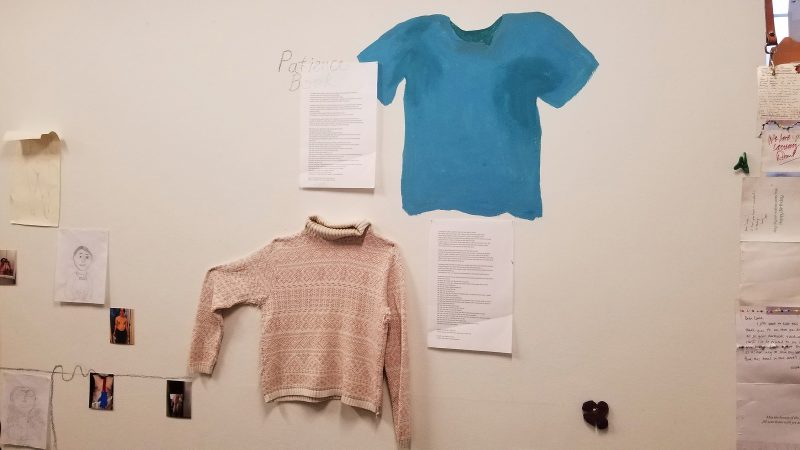
On a nearby wall is a blue shirt painted with loose brush strokes. Its corresponding poem starts, “I think about the old shirts that my Dad used to wear/Or maybe still wears them I don’t know I don’t see him that much.” Speidel describes the shirts as, “soft, stained… faded and crumbling, [with] tears in the collar and snags along the hem,” perhaps contextualizing their own clothing creations.
Changes
Patience Book captures the strain Speidel’s trans body has placed on their relationship with their parents. The limits of their parents understanding of gender comes forward as Speidel shares their mother’s belief that, “lots of people feel that way, that they aren’t women” and wonders if their father, “didn’t feel tied to some kind of outline of masculinity,” and “didn’t feel ashamed for being feminine.” There is never an explicit declaration of transphobia, which allows the work to express the general topic of emotional familial dissonance. However trans readers will likely key into the subtle experiences that fill our lives and tell us where we stand with the ones we love.
In the back corner of the room a curtain made of dangling trash separates a series of photographs from the rest of the show. The “beautiful pieces of trash” as Speidel describes them—loose drawings, papers, and plastic bags thrown away by Speidel’s friends and preschool students—create a secluded space but, do not hide the graphic photos behind them. The pictures are of Speidel’s chest after top surgeries — each photo centered on a deep red line of scarring or a removed and scabbing nipple area. The images seem to have been taken daily though they are not arranged in chronological order.
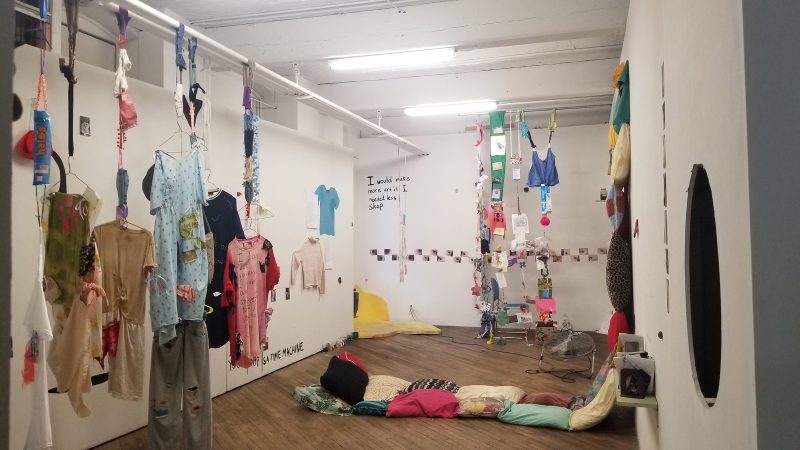
If you google FTM top surgery, which I have many times, the images that come up are of bodies transitioning into flat chests with minimal indications of scarring. Speidel confronts the viewer with reality of how the procedure can affect the body; it is not smooth, clean or pleasant. There is a chair in this cove, inviting you to sit closely with these images as beautiful trash surrounds you.
With a Little Help From Their Friends
In a contemporary art world where it is common to attribute work completed by many hands to a single artist, Speidel’s attention to the relational aspects that allow their work to exist is reminiscent of a folk art practice. Yet because the work is installed at Vox Populi, a gallery that primarily features solo shows, the collective nature of the work is not always clear.
The sheer amount of content in Don’t Miss Me is a bit daunting, and viewers will likely have an immediate impulse to either dive deeper into the space or to move on. I implore you to walk through the show and note the many hands that have touched the work and the emotions that are imbued into every item. When leaving, look into the mirrors resting near the exit and recall all the people, expectations, and defiances that have made you who you are. Then go out into the world.
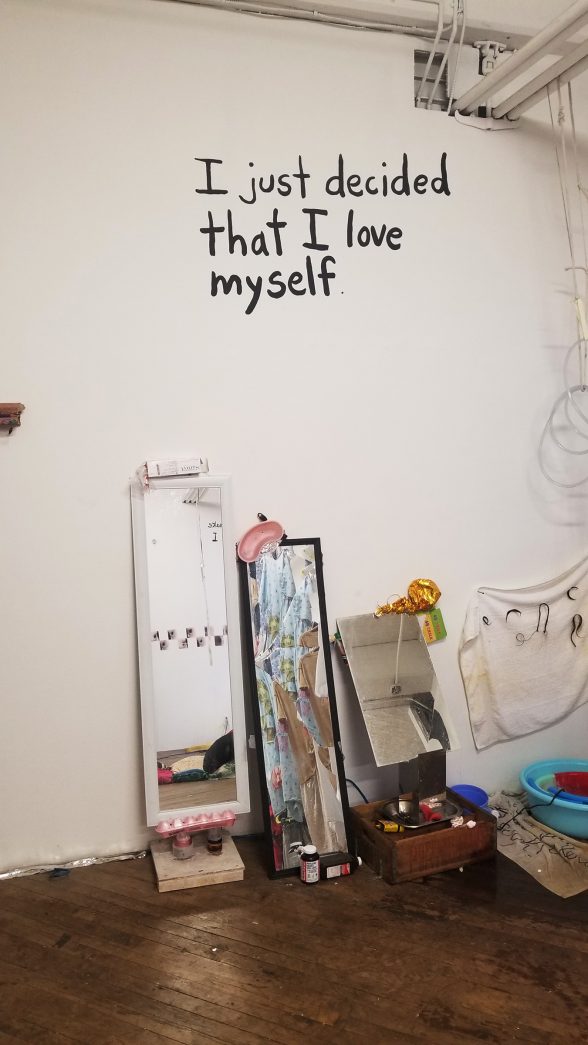
“Don’t Miss Me” is on view September 7-October 20, 2018 at Vox Populi Gallery, 319 N. 11th St., 3rd floor, Philadelphia, PA 19107; Gallery hours, Wed–Sun, 12–6pm; phone, 215-238-1236


